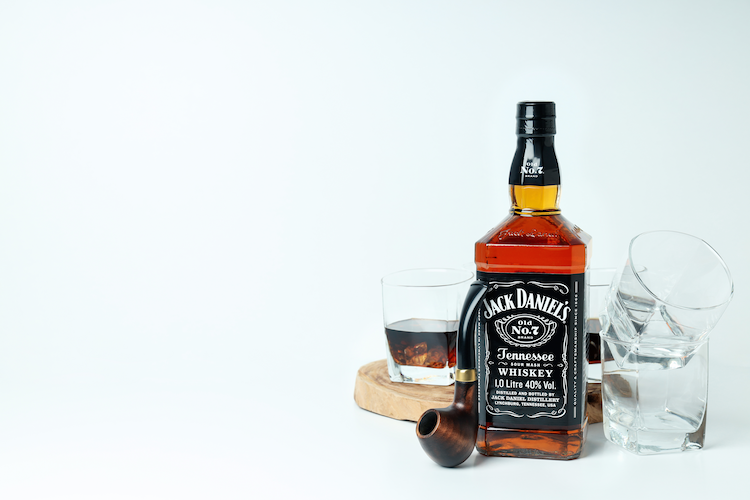Supreme Court to Consider Jack Daniels Trademark Case

The U.S. Supreme Court recently added to its growing list of high-profile intellectual property cases, agreeing to consider Jack Daniel’s Properties, Inc. v. VIP Products LLC. The trademark case involves a dog toy, “Bad Spaniels,” that imitates a Jack Daniel’s whiskey bottle and asks the Court to clarify where courts should draw the line between parody and trademark infringement.
Facts of the Case
Respondent VIP Products LLC (VIP) sells the “Bad Spaniels Silly Squeaker” dog toy, which resembles a bottle of Jack Daniel’s Old No. 7 Black Label Tennessee Whiskey, but has light-hearted, dog-related alterations. For example, the name “Jack Daniel’s” is replaced with “Bad Spaniels,” “Old No. 7” with “Old No. 2,” and alcohol content descriptions with “43% POO BY VOL.” and “100% SMELLY.”
After Jack Daniel’s Properties, Inc. (Jack Daniel’s) demanded that VIP cease selling the toy, VIP filed this action, seeking a declaration that the toy did not infringe JDPI’s trademark rights or, in the alternative, that Jack Daniel’s trade dress and bottle design were not entitled to trademark protection. Jack Daniel’s counterclaimed, asserting trademark infringement and dilution.
The district court found that VIP’s use of Jack Daniel’s trademarks to sell poop-themed dog toys was likely to confuse consumers, infringed Jack Daniel’s marks, and tarnished Jack Daniel’s reputation. The Ninth Circuit reversed. It held that VIP’s First Amendment interest in using Jack Daniel’s trademarks as its own marks on funny dog toys conferred special protection from infringement claims.
In reaching its decision, the Ninth Circuit found that Bad Spaniels is an expressive work and applied the test set forth in Rogers v. Grimaldi, 875 F.2d 994 (2d Cir. 1989), which requires the plaintiff to show that the defendant’s use of the mark is either (1) “not artistically relevant to the underlying work” or (2) “explicitly misleads consumers as to the source or content of the work.” Because it found VIP’s commercial dog toys are “noncommercial,” the Ninth Circuit also found they were exempt from dilution-by-tarnishment claims.
Issues Before the Supreme Court
Jack Daniel’s asked the Supreme Court to intervene, arguing that the Ninth Circuit’s decision would allow humor to serve as a “get out of jail free” card with regard to trademark infringement. “To be sure, everyone likes a good joke. But VIP’s profit-motivated ‘joke’ confuses consumers by taking advantage of Jack Daniel’s hard-earned goodwill,” the company wrote in its petition for certiorari.
The justices have agreed to consider two issues: (1) Whether humorous use of another’s trademark as one’s own on a commercial product is subject to the Lanham Act’s traditional likelihood-of-confusion analysis, 15 U.S.C. § 1125(a)(1), or instead receives heightened First Amendment protection from trademark-infringement claims; and (2) whether humorous use of another’s mark as one’s own on a commercial product is “noncommercial” and thus bars as a matter of law a claim of dilution-by-tarnishment under the Trademark Dilution Revision Act, 15 U.S.C. § 1125(c)(3)(C).
A date has not yet been set for oral arguments. However, the Supreme Court is expected to issue a decision before the term ends in June 2023.
Previous Articles
Supreme Court Rejects Mexico’s Suit Against U.S. Gun Manufacturers
by DONALD SCARINCI on July 8, 2025
In Smith & Wesson Brands v. Estados Unidos Mexicanos, 605 U.S. ____ (2025), the U.S. Supreme Co...
SCOTUS Sides With Employee in Reverse Discrimination Case
by DONALD SCARINCI on July 2, 2025
In Ames v. Ohio Department of Youth Services, 605 U.S. ____ (2025), the U.S. Supreme Court held tha...
Supreme Court Rejects Moment of Threat Doctrine in Deadly Force Case
by DONALD SCARINCI on June 30, 2025
In Barnes v. Felix, 605 U.S. ____ (2025), the U.S. Supreme Court rejected the Fifth Circuit Court o...
The Amendments
-
Amendment1
- Establishment ClauseFree Exercise Clause
- Freedom of Speech
- Freedoms of Press
- Freedom of Assembly, and Petitition
-
Amendment2
- The Right to Bear Arms
-
Amendment4
- Unreasonable Searches and Seizures
-
Amendment5
- Due Process
- Eminent Domain
- Rights of Criminal Defendants
Preamble to the Bill of Rights
Congress of the United States begun and held at the City of New-York, on Wednesday the fourth of March, one thousand seven hundred and eighty nine.
THE Conventions of a number of the States, having at the time of their adopting the Constitution, expressed a desire, in order to prevent misconstruction or abuse of its powers, that further declaratory and restrictive clauses should be added: And as extending the ground of public confidence in the Government, will best ensure the beneficent ends of its institution.





